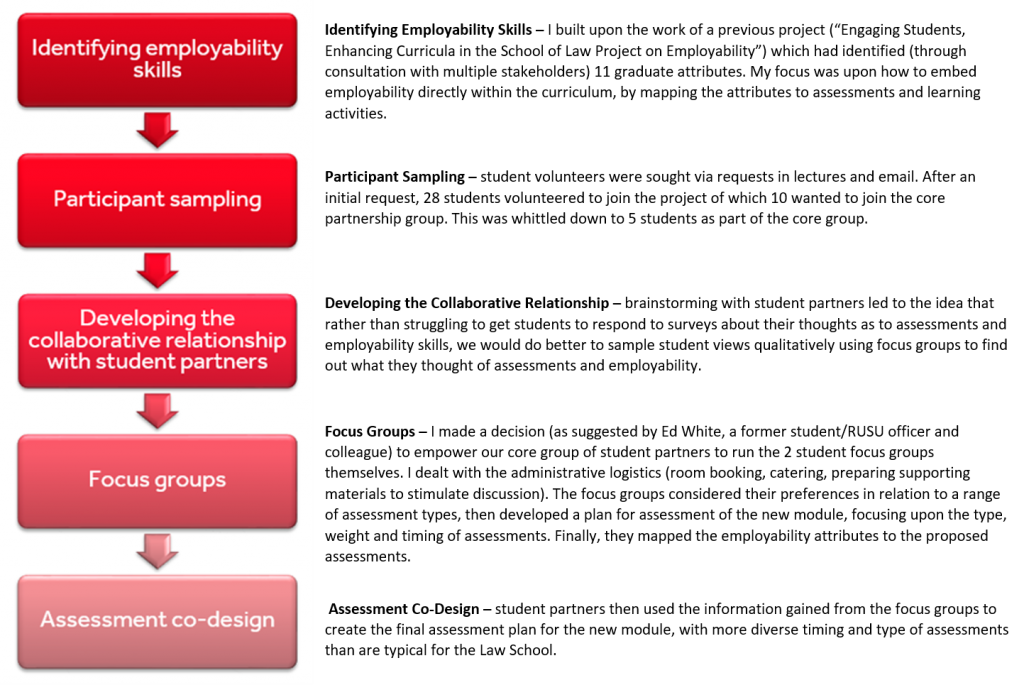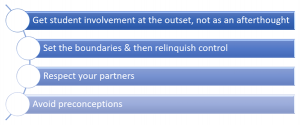Dr. Nicola Abram, Literature and Languages
n.l.abram@reading.ac.uk
Year of activity: 2015-6
Overview

This entry describes the use of screencasts to deliver skills training on a compulsory Part One English Literature module. As a result of the changes outlined here, every student taking English Literature at the University of Reading will have access throughout their degree to a bank of online resources teaching key skills.
Objectives
- To train students in the practical skills needed to succeed in an English Literature degree.
- To induct students into the independent learning required for an English Literature degree.
- To increase students’ engagement in skills training.
- To improve students’ understanding of and adherence to academic conventions.
- To make best use of the contact time (lectures and seminars) on the module.
Context
Over 200 students enter English Literature programmes at the University of Reading each year, from a range of educational backgrounds. To ensure they all have the key skills and theoretical understanding needed to succeed throughout their degrees, we run a compulsory module in Part One (first year) called ‘Research & Criticism’ (EN1RC).
In the previous incarnation of the module, the Autumn Term had been used for a series of 50 minute lectures on research methods, such as ‘Using online sources’, ‘Using published sources’, ‘Citations and referencing’, and ‘Academic writing’. Students also attended a 50 minute seminar each week, the content of which was determined by the seminar tutor. The Spring Term lectures and seminars then inducted students into foundational critical ideas like ‘narrative’, ‘reader’ and ‘author’, as well as issues such as ‘gender and sexuality’, and ‘race and empire’, via a series of set texts.
I was tasked with convening this module from 2014/15. On my appointment, I sought to engage students as more active participants in the skills training component.
Implementation
The process for developing this module began with an informal conversation with another tutor. We identified a disparity between the module content and the mode of delivery: the traditional lecture format did not seem to be the best vehicle for delivering skills training.
Believing that skills training is most effectively conducted through practical and interactive activities, I set about constructing a series of short formative tasks that would enable students to learn by doing. These were designed to break down the process of research and writing into its component parts, so that students could amass the necessary skills bit by bit. Feedback would be given quickly – usually the following week – by their seminar tutor, meaning changes could be implemented prior to attempting a summative (assessed) essay. The specific formative tasks set were: assembling a bibliography, integrating quotation into a short critical commentary, preparing an essay plan, summarising a fiction text, précising a critical text, and drafting an essay introduction.
Students were supported to undertake each task by a screencast: a short (3-5 minute) animation giving the key information about a particular skill and signposting further resources, which students could watch at their own pace and return to at leisure. Screencasts were released to students on a controlled basis via a dedicated area on the module’s Blackboard pages, accompanying the instructions for each formative task. Upon completion of the module, students had therefore engaged with a bank of ten different screencasts. They retain access to this throughout their degrees, via Blackboard.
Most of the screencasts were prepared using the screen capture programme, Camtasia, for which we have multiple departmental licenses. Colleagues who had previously delivered the skills lectures were given the technical support (where necessary) to repurpose that material into a screencast, and others were invited to volunteer new material. A colleague in Study Advice also contributed a screencast tailored to the needs of English Literature students. This collaborative approach produced a welcome range of different outcomes. Some colleagues used PowerPoint to present written and visual content, while others used Prezi, which better represents the spatial arrangement of the material. Some recorded a voiceover, which provided a welcome sense of connection with an individual tutor, while others chose to use a musical soundtrack downloaded from a royalty-free website such as www.incompetech.com. A few colleagues used the animation tools PowToon and VideoScribe, rather than simply recording a presentation onscreen.
A meeting with staff teaching on the module was held at the end of its first term and after its first full year. Their reflections on students’ submitted tasks and classroom engagement proved invaluable for the module’s iterative design.
Impact
As a result of this module, students are evidently more alert to the many components of professional writing and are better equipped to perform good academic practice. Selected comments from qualitative module evaluations affirmed the usefulness of this immersive model of skills training: “The first [formative] tasks such as the bibliography were very useful to bridge the gap into HE”, “All the feedback I received was very helpful and helped me improve my work”, and “The screencasts were also a fantastic idea”.
The screencasts have been watched multiple times by students, suggesting that they are a useful resource that can be returned to and referred to repeatedly. The current most-watched is ‘Incorporating quotations’, which has had 969 views since it was uploaded in January 2015.
Using screencasts as a teaching delivery tool has also provided the opportunity to develop the content of the course. Removing the skills content from lectures freed up contact time to be given to important theoretical material and set texts.
Reflections
The model of interactive skills training harnesses the power of constructive alignment, where teaching process and assessment method are calculated to maximise students’ engagement with the subject and/or skills being taught. Even for a discursive discipline like English, the QAA Subject Benchmark Statement encourages assessments “aimed at the development of specific skills (including IT and bibliographical exercises)”.
Although I did not have a particular student demographic in mind when making these changes, the staged development of writing skills seems to offer specific support to international students and English as additional language (EAL) learners, who may be unfamiliar with UK academic conventions and benefit from an atomised approach to writing with regular formative feedback. However, all students benefit from this formal induction to academic literacy. Running a core skills module has an equalising effect on the cohort, compensating for disparities in prior educational contexts and attainment.
Embedding the screencasts to view on Blackboard Learn was awkward since they could not be watched inline by users whose devices did not support a specific plugin. Screencasts were therefore hosted on www.screencast.com, with stable links provided in Blackboard Learn. Both uploading and viewing were easy and effective, but the cap on bandwidth (2GB per month) meant a need to upgrade to a paid-for subscription (currently £8.36 per month) in months where traffic was particularly high. In future I will consider using YouTube, with appropriate privacy settings, to continue the periodic release of screencasts through link-only access.
Follow up
As of 2016-17, the module continues to run using screencasts as a key teaching method. Additional screencasts have been added to the suite as need arose, for instance to support students’ use of Turnitin as a formative tool, in line with University of Reading strategy. Some screencasts have been replaced as a result of staff turnover. But most remain in use, meaning that the initial work to prepare the content and conduct the screen capture continues to pay off.
Various colleagues in the Department of English Literature have found screencasts to be a useful method for wider skills training. We are now preparing a suite of screencasts to support prospective students and new entrants with the transition to higher education, on topics like ‘What is a lecture?’ and ‘How should I communicate with my tutors?’. We also use screencasts more widely, including as a student assessment method: some of these, along with our public-facing promotional videos, have been given British Sign Language interpretation (contact Dr Cindy Becker for details).
Work is now being undertaken to enhance the training component of the module further through Technology Enhanced Learning, by using quizzes on Blackboard Learn to provide students with immediate feedback on their understanding of skills like proper referencing practice.
Links
Academic Writing: Essay presentation & proof-reading:http://www.screencast.com/t/EXn2au7r8Wj7
Writing a critical precis: http://www.screencast.com/t/83Wz0I4rA
Citations and referencing: http://www.screencast.com/t/aT8PolyDuH
English Literature at the University of Reading YouTube Channel: https://www.youtube.com/user/EnglishAtReading

